Articles
PRC Ambassador to South Korea Xing Haiming’s public statement in June sharpened Beijing-Seoul frictions following President Yoon Suk Yeol’s Taiwan remarks in an April interview, sparking mutual accusations of interference in internal affairs. Multilateral engagements offered opportunities to reaffirm China-ROK relations through bilateral talks between China’s Commerce Minister Wang Wentao and South Korea’s Trade Minister Ahn Duk-geun (May), Defense Ministers Li Shangfu and Lee Jong-sup (June), Foreign Ministers Wang Yi and Park Jin (July), Finance Ministers Liu Kun and Choo Kyung-ho (July), and Trade Ministers Wang Shouwen and Ahn (August). The revival of high-level exchanges, Beijing’s lifting of travel restrictions on South Korea in August, and North Korea’s border reopening that same month are sources of optimism in China-Korea relations despite overarching tensions. Discord remains on regional security priorities, South Korea’s overt alignment with the United States under the Yoon administration, and the escalating US-China technology war. Meanwhile, Chinese and Russian delegations joined Kim Jong Un in Pyongyang to celebrate the 70th anniversary of the end of the Korean War, reflecting the shape of North Korea’s first post-COVID diplomatic activity.
These exchanges occurred two weeks after Beijing and Moscow blocked UN Security Council (UNSC) action on North Korea’s July 12 ICBM test. The UNSC remained paralyzed by Chinese and Russian opposition to UN initiatives both to condemn Pyongyang for its two failed satellite launches in May and August, and to spotlight North Korean human rights violations. Yoon’s August summit with US President Joe Biden and Japanese Prime Minister Kishida Fumio advancing the trilateral partnership drew Chinese disapproval and South Korean domestic ambivalence. US-China retaliatory sanctions from May raised potential costs for South Korean chip industry leaders amid the United States’ reemergence as South Korea’s biggest market for exports. Current trends in China-Korea relations indicate tightening linkages between regional economic and security dilemmas.
Beijing and Seoul’s Extended Diplomatic Clash
Beijing and Seoul have grappled with prolonged frictions since Yoon’s Taiwan remarks in an April interview with Reuters and China’s stern reaction. Director-General of the Ministry of Foreign Affairs’ Department of Asian Affairs Liu Jinsong reaffirmed “China’s core concerns” to foreign ministry counterparts in Seoul on May 22. Vice Foreign Minister Sun Weidong reasserted China’s core interests to South Korea’s Deputy Minister for Political Affairs Choi Youngsam in Beijing on July 4. The latest clashes were sparked by Chinese Ambassador Xing Haiming’s June 8 remarks in Seoul to main opposition Democratic Party (DP) leader Lee Jae-myung. Xing told Lee that those who “bet on China’s defeat” in the US-China rivalry “will definitely regret it.” Noting “many difficulties” in China-South Korea relations, Xing stated, “China is free of responsibility. We will be grateful if Korea respects China’s key interests.”
South Korea’s First Vice Foreign Minister Chang Ho-jin summoned Xing on June 9, protesting his “unreasonable and provocative” points and possible interference in South Korea’s internal affairs. In Beijing, China’s Assistant Foreign Minister Nong Rong called in South Korea’s Ambassador to China Chung Jae-ho to protest “the ROK’s recent inappropriate response” to the Xing-Lee exchange. China’s Foreign Ministry Spokesperson Wang Wenbin addressed wider bilateral controversies on June 9. In response to Xing’s remarks and reported director-general discussions on May 22 conveying China’s “Four Nos,” Wang repeated that “the current difficulties and challenges…are not caused by China.” On warnings that Beijing will deny high-level contact and cooperation on North Korea if South Korea interferes in China’s core interests or coordinates military strategies with the United States and Japan, Wang reinforced the “one-China” principle as an “internal affair…at the core of China’s core interests.” South Korea’s Ministry of Foreign Affairs later indicated that Xing’s offense “lies in intentionally criticizing our government’s policy with inaccurate information.” The South Korean presidential office redirected Beijing’s complaints by reasserting the “diplomats’ duty to respect the laws of the host country” and “not to interfere” in “internal affairs.”
Chinese and South Korean mutual accusations unleashed domestic uproar in South Korea about Xing’s comments, viewed as a thinly veiled threat to the Yoon administration for favoring the United States and reversing his liberal predecessor’s pro-China direction. Ruling People Power Party (PPP) leader Kim Gi-hyeon claimed that “Ambassador Xing and Chairman Lee were jointly blaming our government,” a “clear interference in domestic affairs and a serious diplomatic discourtesy” on Xing’s part. While Kim targeted his political rivals for facilitating such interference, his party demanded a “responsible apology” from Xing and the Chinese government. PPP lawmakers demanded the recalling of the Chinese ambassador and voiced on social media: “It appeared as if China still considers itself the center of the world and regards South Korea as a vassal state in tributary relations.”
South Korea’s domestic turmoil only deepened with DP visits to China days after the Xing-Lee meeting. In Beijing, a group of DP lawmakers met officials from the National People’s Congress and Ministry of Foreign Affairs as part of a five-day visit from June 12 “aimed at seeking improvement in relations as China is important for our businesses and the economy.” Another DP delegation followed three days later for cultural exchanges. DP leader Lee Jae-myung used a June 15 event on inter-Korean ties to criticize Seoul’s “rapidly worsened” relations with Beijing and Moscow and declare that “it is time to revive pragmatic diplomacy centered on national interests.”
Rebuilding China-South Korea Relations “Based on Mutual Respect, Reciprocity, and Common Interest”
In response to the Xing-Lee controversy, other Yoon officials sought to stabilize relations with Beijing. Addressing a forum in Seoul a day after the incident, National Security Advisor Cho Tae-yong promised to build “healthy” China-South Korea relations while also promoting ties with the United States and Japan. Before departing to Tokyo the following week, he reaffirmed the Yoon administration’s “unchanging position” on relations with China, “placing the two core keywords of mutual respect and common interests at the center.” In a June 25 Yonhap interview, Foreign Minister Park Jin backed President Yoon’s position of developing bilateral relations “based on mutual respect, reciprocity and common interest.”
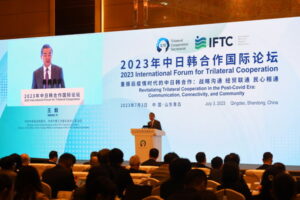
Figure 1 2023 International Forum for China-South Korea-Japan Trilateral Cooperation opens in Qingdao. Photo: Foreign Ministry of the People’s Republic of China
Regional engagements presented opportunities to pursue such relations. On the sidelines of ASEAN foreign ministerial meetings in Jakarta on July 14, China’s Foreign Minister Wang Yi and Park renewed the commitment to advancing the partnership envisioned by the 2022 Xi -Yoon summit. They agreed to promote bilateral diplomacy, supply chain management, cultural exchanges, North Korea policy coordination, and cooperation with Japan. Recognizing “increasing difficulties” in bilateral relations, Wang Yi affirmed that Beijing’s policy toward South Korea “does not target any third party, nor should it be affected by any third party.” Japan’s Foreign Minister Hayashi Yoshimasa joined the two ministers for ASEAN+3 talks on July 13, where Park vowed South Korea “will play a more active role to move trilateral cooperation forward” as host of the anticipated ninth leader-level trilateral summit. The three neighbors participated in RCEP’s fourth committee meeting the following week.
As host of a trilateral forum in Qingdao on July 3, China’s foreign ministry promoted China-South Korea-Japan relations through a four-part series on Wang’s remarks, emphasizing mutual respect, independence, and openness and inclusiveness. Wang reassured that China “will not tread the old path of expansion and plunder pursued by some major countries in history,” argued “no relations should be used to contain or even suppress neighboring countries,” and urged the three partners to “see each other’s development as their opportunities.” He proposed that the Trilateral Cooperation Secretariat “should promote bilateral cooperation through multilateral cooperation.” In May, South Korea hosted the 23rd Trilateral Finance Ministers and Central Bank Governor’s Meeting advancing post-pandemic recovery initiatives. Seoul seeks to restart the trilateral leader-level summit this year after three suspensions since its initiation in 2008, most recently from 2020 due to South Korea-Japan tensions and the COVID-19 pandemic. A telephone conversation between Wang and Park in August reinforced anticipation for expanding high-level dialogue.
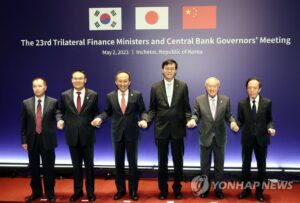
Figure 2 23rd China-South Korea-Japan Finance Ministers and Central Bank Governors’ Meeting is held in Incheon. Photo: Yonhap
Another source of relative optimism is China’s lifting of COVID-19 restrictions on Chinese group tours to an additional 78 countries, which included South Korea. Announced on Aug. 10, the policy shift ends a six-year ban on South Korea since the 2017 THAAD dispute. South Korea’s Ministry of Culture, Sports, and Tourism took active steps this year to revive South Korea’s tourism industry, including the resumption of visa waivers for Chinese group travelers to Jeju Island. In July, Ambassador Xing supported such promotion efforts in a meeting with Jeju’s Gov. Oh Young-hun. Beijing’s lifting of the pandemic-era ban drove a resurgence of Chinese cruise ship bookings to the island. However, China-South Korea passenger travel from January to April 2023 amounted to just 13% of 2019 pre-pandemic levels, despite more than 70% recovery in South Korean routes with Japan and some Southeast Asian neighbors.
China-South Korea Coordination on Korean Peninsula and Regional Security
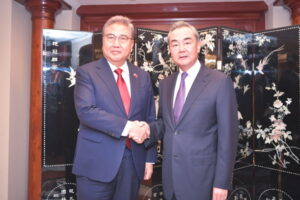
Figure 3 Wang Yi and Park Jin hold talks on the sidelines of ASEAN foreign ministers’ meetings in Jakarta. Photo: Foreign Ministry of the People’s Republic of China
North Korea and other regional security concerns remain enduring sources of pessimism. North Korea conducted 69 ballistic missile tests last year, almost three times its previous record of 25. Wang Yi and Park Jin’s July meeting in Jakarta occurred a day after Beijing and Moscow blocked UNSC action on Pyongyang’s July 12 Hwasong-18 ICBM test. In addition to urging China to “play a constructive role” in peninsula security, Park drew broader support including an ASEAN Foreign Ministers’ Statement condemning Pyongyang’s ballistic missile launch. When regional tensions resurfaced with clashes between the Chinese coast guard and Philippines vessels in August, the South Korean Foreign Ministry renewed its support for a “rules-based order in the South China Sea.”
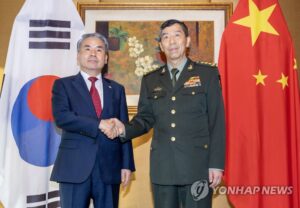
Figure 4 Chinese and South Korean defense ministers Li Shangfu and Lee Jong-sup meet in Singapore on the sidelines of the Shangri-La Dialogue. Photo: Yonhap
Multilateral gatherings in Southeast Asia also facilitated China-South Korea military exchanges. Defense Ministers Li Shangfu and Lee Jong-sup met on June 3 at the Shangri-La Dialogue in Singapore, where Lee described North Korea as “a state turning the Pacific into its firing range.” Pyongyang claimed a failed space rocket launch two days before the event. In his speech on regional tensions, Lee called for “united action” on UNSC resolutions, emphasized the global risks of “choosing inactivity,” and outlined Yoon’s policy steps on North Korea including US-South Korea military deterrence and Seoul’s “Audacious Initiative” of economic incentives for denuclearization commitments. Lee noted existing sanctions remain constrained since “some countries are ignoring North Korea’s unlawful behaviors,” while additional resolutions have not passed “due to objections by countries with important responsibilities.” Presenting “China’s New Security Initiatives” a day later, Li stated “China has played a constructive role” on the peninsula through “political reconciliation,” while “some countries” have favored “exacerbating tension” through military options. The United States imposed sanctions on two China-based DPRK nationals on June 15, when Pyongyang test-fired two short-range ballistic missiles.
US Secretary of State Antony Blinken’s June 18-19 visit to Beijing was viewed as “an olive branch to China” creating an opportunity for improving China-South Korea relations. However, a contributor for North Korea’s Korean Central News Agency called it “a disgraceful begging trip of the provoker admitting the failure of the policy of putting pressure on China.” Director-General of the Ministry of Foreign Affairs’ Department of US Affairs Kwon Jong-gun stated in a June 24 press statement that “there will be neither restraint nor adjustment” in North Korea’s “exercise of its right to self-defense.” Kim Jong Un’s sister Kim Yo Jong reiterated this position to oppose the UNSC’s July 13 meeting on Pyongyang’s ICBM test.
As Yoon’s April 26 joint statement with Biden sharpened Chinese criticism over extended deterrence, Yoon told reporters in Seoul on May 2, “we’re left with no choice” given China’s failure to enforce UNSC sanctions. After South Korea’s June 6 election as a nonpermanent UNSC member between 2024 and 2025, Foreign Minster Park described existing UNSC mechanisms on North Korean violations as “virtually paralyzed.” Yoon’s National Security Strategy, released on June 7, further projected South Korea’s resolve as a global pivotal state against North Korean threats.
United Nations Security Council Paralysis and Chinese and Russian “Celebration” of North Korea
Chinese and Russian protection of Pyongyang from US-led UNSC efforts to condemn the North for violating prohibitions on ballistic missile technology in its satellite launches turned the UNSC into a forum for rhetorical combat over North Korea. The UNSC held three sessions following North Korea’s May 31 failed satellite launch, July 12 ICBM launch, and Aug. 23 failed satellite launch. At each of these sessions, dialogue between US and Chinese officials grew increasingly pointed while the UNSC itself remained immobilized and unable to respond to North Korean violations. During a June 2 session, Alternate Representative for Special Political Affairs Robert Wood anticipated that “China and Russia will likely once again attempt to draw false equivalences between the DPRK’s unlawful ballistic missile launches and lawful, defensive, and pre-announced US-ROK joint military exercises.” On July 13, Acting Deputy Representative to the United Nations Jeffrey DeLaurentis stated that in contrast to UNSC condemnation of North Korean ICBM launches in 2017, “Russia and China have prevented this Council from speaking with one voice…Pyongyang is demonstrating it feels emboldened—perhaps even encouraged—to continue in this manner because China and Russia have consistently prevented this Council from taking action to halt these transgressions.” Aug. 25, Ambassador Linda Thomas-Greenfield called out China and Russia for “celebrating violations of Security Council resolutions and continuing to block Council action,” noting that UNSC unity is obstructed not by the 13 members that condemned the launch, but by the two that did not.
Chinese Ambassador Geng Shuang responded with reviews of past multilateral efforts to facilitate US-DPRK dialogue and encourage denuclearization, concluding that “Some countries have repeatedly indicated that the Security Council must not remain indifferent to the status quo of the Peninsula, but should play a constructive role. China shares this view. How can the Security Council play a constructive role? Is it constructive to point the finger at one party and to put all the blame on one party? Obviously not…The constructive role of the Council should be demonstrated by its efforts to promote de-escalation, mutual trust, and unity.” Geng’s response to Thomas-Greenfield regarding North Korea’s Aug. 23 launch was even more pointed. He argued that “Given where we are, the Council needs unity, not fragmentation or confrontation, its actions should be of assistance, not a hindrance to the political settlement of the Peninsula issue. What these countries should really do is not to use the Council’s platform to intensify tension and escalate the situation, but to come up with practical actions and concrete proposals to respond to the DPRK’s legitimate concerns and to make efforts and create conditions for the relaunch of the dialogue.”
The United States and China also clashed over the push by the US, Albania, Japan, and South Korea to hold the first meeting of the UNSC since 2017 on the human rights situation in North Korea on Aug. 17, which included testimony from UN High Commissioner for Human Rights Volker Turk, UN Special Rapporteur on the Situation of Human Rights in North Korea Elizabeth Salmon, and a North Korean defector as a civil society representative. Ambassador Geng stated China’s opposition to the hearing by arguing that “pushing the Council to consider the human rights situation in the DPRK will not help ease, but escalate the situation. It is irresponsible and nonconstructive, and an abuse of the Council’s power.”
North Korea’s Post-COVID “Victory Day” Hosting of Chinese and Russian Representatives in Pyongyang
North Korea’s post-pandemic diplomatic emergence over the summer is a clear reflection of sharpening geopolitical rivalry and the response from Pyongyang. The resumption of in-person diplomacy with North Korea was marked by the arrival in North Korea and diplomatic welcome of Wang Yajun as China’s newly appointed ambassador to North Korea in early May. Ambassador Wang paid courtesy calls to leading DPRK officials including Foreign Minister Choe Son-hui and Premier Kim Tok-hun and received a special tour of Pyongyang. Wang’s welcome presaged the normalization of North Korean diplomacy and resumption of official trade with China, including the resumption of Air Koryo flights between Beijing and Pyongyang in mid-August and the participation of a North Korean taekwondo team in a sporting competition in Kazakhstan. These exchanges signified a broader resumption of diplomatic exchanges between North Korea and the rest of the world.
The event that most clearly symbolized the resumption of in-person diplomacy by Pyongyang was North Korea’s reception of China’s CCP Central Committee member Li Hongzhong and Russia’s Defense Minister Sergey Shoigu for events marking the 70th anniversary of the signing of the armistice ending the Korean War, celebrated as Victory Day in North Korea. In advance of the anniversary, Kim Jong Un paid respects at the Cemetery of Martyrs of the Chinese People’s Volunteers (CPV) and sent birthday greetings to President Xi Jinping. North Korean media also marked the 62nd anniversary of the signing of the China-DPRK Friendship Treaty. In addition, the North Korean Ministry of Foreign Affairs provided a statement of support for China in opposition to US provision of arms to Taiwan.
The presence of both senior Chinese and Russian representatives in Pyongyang for the anniversary signaled an emphasis on the emergence of a China-North Korea-Russia coalition in anticipation of and opposition to the emergence of an opposing US-South Korea-Japan coalition at Camp David. However, Kim’s reception of his Chinese and Russian visitors was not trilateral, and North Korean attention to Defense Minister Shoigu seemed to upstage the reception of the Chinese delegation.
Chinese and Korean Responses to the US-South Korea-Japan Summit
The Biden-Yoon-Kishida Camp David summit on Aug. 18, launching “a new era of trilateral partnership” on rising security challenges, sharpened regional attention on Beijing’s response. In addition to reaffirming their commitment to North Korea’s denuclearization, the three leaders jointly opposed “any unilateral attempts to change the status quo in the waters of the Indo-Pacific,” citing China’s “dangerous and aggressive behavior supporting unlawful maritime claims” in the South China Sea. They called cross-strait peace and stability “an indispensable element of security and prosperity in the international community.” China’s foreign ministry renewed its position on the two issues, calling the summit “an act of gross interference in China’s internal affairs, a deliberate attempt to sow discord between China and our neighbors and a serious violation of norms in international relations.” In an Aug. 21 Yonhap interview confirming Beijing was briefed on the summit’s outcome, Minister Park Jin assured that US-South Korea-Japan trilateralism does not target a specific actor.
Through Chinese state media, Chinese analysts called the summit a “‘starting shot’ for new cold war,” a “‘mini-NATO’ in the making,” and a dividing force in “China-Japan-South Korea economic and trade ties.” Korea experts like Lu Chao at Liaoning Academy of Social Sciences pointed to gaps in interests between the United States and its allies. While South Korea places top priority on peninsula security rather than China, “South Korea’s losses are likely to be the biggest” when it comes to science and technology cooperation. China Foreign Affairs University’s Li Haidong emphasized the domestic costs of “unbalanced” diplomacy and “lack of independence” for South Korea, tracing Yoon’s declining approval ratings to pro-US policies and outreach to Japan. He also warned against North Korean and Russian reactions. In the weeks ahead of the Camp David summit, the China-North Korea-Russia intimacy displayed at commemorations of the Korean War armistice in Pyongyang raised South Korean calls for trilateral security cooperation with US and Japanese counterparts.
South Korean public concern extends to the economic implications of US-South Korea-Japan cooperation amid Beijing’s gradual lifting of post-THAAD restrictions. While South Korea may gain the most from the trilateral supply chain partnership by securing traditional advantages over China, it also faces the biggest risks of Chinese economic retaliation. To manage this “double-edged sword” of “trilateral economic solidarity,” a Korea Times contributor called on the Yoon administration to more forcefully persuade Washington not to restrain Korean chip and automakers and strengthen industrial policies at home. The costs of Chinese economic retaliation were soon displayed by Beijing’s ban on Japanese seafood imports after Japan’s release of treated radioactive water from the Fukushima nuclear plant into the Pacific Ocean. Initiated from Aug. 24, the water discharge exacerbated protests in both China and South Korea.
China-South Korea Economic Partnership Confronts “Tech Cold War”
Pessimism remains over the China-ROK economic partnership given US-China competition and South Korean domestic division. ROK exports to China, which declined by 26% between January and June 2023, drive Korean pessimism after last year’s record high trade deficit numbers. By Bank of Korea measures, the United States replaced China as South Korea’s biggest goods market last year, for the first time since 2004. Between January and June 2023, the US even replaced China as the second biggest K-pop market abroad, behind Japan. During his June meeting with DP leader Lee Jae-myung, Ambassador Xing attributed South Korea’s mounting trade deficit to “some efforts to get out of China.” But ruling PPP leader Kim Gi-hyeon stressed China’s economic importance in a meeting with White House Indo-Pacific Coordinator Kurt Campbell on July 11, toning down his party’s earlier hostility toward Beijing.
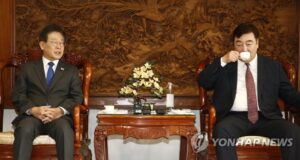
Figure 5 Chinese Ambassador Xing Haiming and Democratic Party leader Lee Jae-myung meet in Seoul. Photo: Yonhap
The US-China “tech cold war” implies a major restructuring of South Korean trade and investment. Beijing’s sanctions on US chipmaker Micron in May heightened South Korea’s dilemma as a global industry leader. The sanctions were announced a day after G7 leaders pledged to “push for a level playing field” given “challenges posed by China’s non-market policies and practices.” A JoongAng Daily contributor wondered, “Could Korean chipmakers replace the demand for chips in China?,” questioning reported US requests to Seoul before the April Biden-Yoon summit to avoid such a scenario. Beijing’s next “sword of resource control” emerged on July 3 ahead of US Secretary of the Treasury Janet Yellen’s China trip in the form of export restrictions on two metals used in chip-making. In August, Biden’s executive order restricting US investment in three Chinese high-tech sectors raised South Korean public calls for diversifying export markets. Such calls cited the 14-member “alternative Asian supply chain” (Altasia) to manage US-China technology competition in the long run. Yoon’s June state visit to Vietnam, the leading source of South Korea’s trade surplus and third biggest trade partner after replacing Japan last year, suggested that “Vietnam has emerged as the alternative for China.”
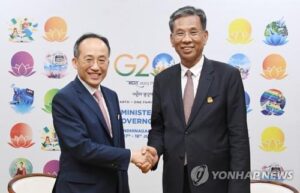
Figure 6 South Korean Finance Minister Choo Kyung-ho (L) poses for a photo with Chinese Finance Minister Liu Kun as they meet on the sidelines of a meeting of finance ministers and central bank governors from the Group of 20 major economies in Gandhinagar, India, on July 17, 2023, in this photo provided by Choo’s office. Photo: Yonhap
China and South Korea’s 27th vice minister-level joint economic committee meeting in Beijing on Aug. 29 focused on supply chains, bilateral consultation mechanisms, the service sector, and new sectors like the digital and green economies. G20 meetings in India facilitated bilateral talks on such priorities between finance ministers Liu Kun and Choo Kyung-ho in July, and trade ministers Wang Shouwen and Ahn Duk-geun in August. Wang and Ahn agreed to expand bilateral trade and investment through regional partnerships like RCEP. In separate talks with US Trade Representative Katherine Tai, Ahn also affirmed plans to implement new initiatives under the US-South Korea-Japan framework and IPEF.
At a May parliamentary session, Finance Minister Choo denied any “plan to decouple from China,” South Korea’s “most important” economic partner. In a May meeting with AIIB Vice President Ludger Schuknecht in Seoul, South Korea’s First Vice Finance Minister Bang Ki-sun sought joint opportunities for Korean businesses, financial institutions, and workers. Supply chain cooperation was a priority focus of the 12th Asia Business Summit in Seoul on July 5, co-hosted by the Federation of Korean Industries and Japan Business Federation and also bringing Chinese and Taiwanese counterparts. It was also an overlapping focus area of APEC and IPEF’s parallel ministerial talks in Detroit, where Trade Minister Ahn met China’s Commerce Minister Wang Wentao on May 25, and US counterpart Tai two days later.
Conclusion: Rethinking “The United States for Security and China for Economy”
During her May visit to Seoul, WTO Director-General Ngozi Okonjo-Iweala described South Korea as “a global poster child for trade” that is “relatively friendly with both sides” in the US-China rivalry. But China’s shifting place in South Korea’s economic strategy intensifies domestic polarization on anmigyeongjung (the United States for security and China for economy). A Korea Times editorial voiced in June that “while maintaining tight security in alliance with the US,” Seoul “needs to expand its export markets by reducing its reliance on China.” Another concluded in August, “Korea can no longer depend on America for security and China for the economy.” Others are more concerned about ensuring economic security amid the US-China tech rivalry. As one Korea Times commentator argued in July after the US treasury secretary opposed Beijing’s export controls, “If Yellen’s comment means allies should not seek independent solutions with Beijing, that narrows Seoul’s room to move.”
In response to the Camp David summit in August, China’s Foreign Ministry mapped out “two trajectories in the Asia-Pacific”: a path of economic integration exemplified by RCEP and CPTPP, and another one of Cold War confrontation modeled by US-South Korea-Japan and other “exclusionary groupings.” While China urged South Korea to “join China and other countries in the region,” South Korea’s strategic direction also depends on broader global ambitions. Reflecting on South Korea’s new status as a nonpermanent UNSC member, one account of the UNSC’s emerging bloc dynamics called South Korea “a contributing member of the liberal bloc” but argued “South Korean leaders and citizens do not seem to grasp” this envisioned identity.
The anticipated deepening of US-ROK alliance cooperation on supply chain resiliency and technology development suggests profound implications for South Korea’s economic orientation and newfound interdependence with US markets, as opposed to historic interdependence with Chinese markets, as well as for South Korea’s geopolitical orientation. But for South Korea, the task of de-risking from China in key sectors such as semiconductors also involves significant economic opportunity costs. Those costs have been reduced somewhat by Chinese economic policies that have raised barriers to entry for Korean companies in China’s domestic economy, and near-term uncertainties about China’s post-COVID economic recovery. In addition, South Korea has pursued decade-long efforts to diversify its supply chains to avoid overdependence on China, calling into question the possible diversionary effects of coalition arrangements among the United States, South Korea, and Japan. These factors will sustain and complicate management of a China-South Korea relationship focused both on common interests and mutual respect, especially as the building of rival coalitions will reinforce the strategic nature of the China-North Korea relationship. But the biggest challenge for the China-South Korea relationship may lie in the psychology of the relationship, particularly whether both sides can find ways to address the gap between South Korea’s historic role as a peripheral state and South Korea’s aspiration to be a global pivotal state.
May 2, 2023: 23rd China-South Korea-Japan Finance Ministers and Central Bank Governors’ Meeting is held in Incheon.
May 8, 2023: North Korea’s Foreign Minister Choe Son Hui meets Wang Yajun, the new Chinese ambassador to North Korea.
May 22, 2023: China’s Director General of Asian Affairs Liu Jinsong meets South Korean counterpart Choi Yong-jun and Deputy Minister for Political Affairs Choi Youngsam in Seoul.
May 25, 2023: Chinese and South Korean ministers Wang Wentao and Ahn Duk-guen meet on sidelines of the APEC trade ministers’ meeting in Detroit.
May 31, 2023: Pyongyang fails to launch a claimed military spy satellite.
June 2, 2023: UN Security Council holds briefing on North Korea’s May 31 reconnaissance satellite launch.
June 3, 2023: Chinese and South Korean defense ministers Li Shangfu and Lee Jong-sup meet in Singapore on the sidelines of the Shangri-La Dialogue.
June 7, 2023: South Korea’s defense ministry lodges complaint with China and Russia over Jun. 6 KADIZ incursions.
June 8, 2023: Chinese Ambassador Xing Haiming and Democratic Party leader Lee Jae-myung meet in Seoul.
June 9, 2023: South Korea’s foreign ministry summons Chinese Ambassador Xing Haiming in Seoul.
June 10, 2023: Chinese foreign ministry summons South Korean Ambassador Chung Jae-ho in Beijing.
June 12-16, 2023: Democratic Party lawmakers visit Beijing.
June 12, 2023: Korean prosecutors announce the indictment of a former Samsung Electronics executive for stealing trade secrets to replicate a chip plant in China.
June, 14, 2023: South Korea’s oceans ministry announces agreement reached with China the previous week on illegal fishing.
June 15, 2023: Pyongyang fires two short-range ballistic missiles.
June 15, 2023: Kim Jong Un sends Xi Jinping a 70th birthday letter.
June 15, 2023: United States imposes sanctions on two China-based North Korean nationals for supporting Pyongyang’s weapons development programs.
June 15, 2023: Pyongyang fires two short-range ballistic missiles.
June 15, 2023: Democratic Party lawmakers start their China visit.
June 18, 2023: South Korean soccer player Son Jun-ho is placed under arrest in China on bribery charges.
June 23, 2023: National Human Rights Commission of Korea urges China not to repatriate North Korean defectors.
June 29, 2023: North Korea finishes renovating the China-North Korea friendship tower in Pyongyang.
July 3, 2023: 2023 International Forum for China-South Korea-Japan Trilateral Cooperation opens in Qingdao.
July 4, 2023: Chinese Vice Foreign Minister Sun Weidong meets South Korean Deputy Minister for Political Affairs Choi Youngsam in Beijing.
July 4, 2023: Ninth South Korea-China Economic Cooperation Forum is held in Hubei, China.
July 11, 2023: Chinese and North Korean officials in Pyongyang attend Chinese embassy celebrations of the friendship treaty’s 62nd anniversary.
July 12, 2023: North Korea test-fires a Hwasong-18 ICBM.
July 12, 2023: UN Security Council holds a briefing on North Korea’s ICBM launch.
July 13, 2023: China and Russia block UNSC action on North Korea.
July 14, 2023: Wang Yi and Park Jin hold talks on sidelines of ASEAN foreign ministers’ meetings in Jakarta.
July 17, 2023: Chinese and South Korean finance ministers meet in India on the sidelines of a G20 meeting.
July 27, 2023: CCP Politburo member Li Hongzhong and Russian Defense Minister Sergei Shoigu attend 70th anniversary celebrations of the Korean War armistice in Pyongyang.
Aug. 10, 2023: China’s Ministry of Culture and Tourism announces it will allow Chinese group tours to 78 countries including South Korea.
Aug. 16, 2023: Minister of Unification Kim Yung-ho calls on China to stop repatriating North Korean defectors to North Korea and requests China’s help in sending North Korean defectors to South Korea.
Aug. 17, 2023: The UN Security Council holds a briefing on North Korea’s human rights situation.
Aug. 18, 2023: North Korean taekwondo athletes and officials arrive in Beijing, North Korea’s first delegation to travel abroad since 2020, to attend the opening ceremony of the ITF Taekwondo World Championships held in Kazakhstan.
Aug. 22, 2023: Post-pandemic passenger flights between China and North Korea resume with Air Koryo’s arrival in Beijing.
Aug. 23, 2023: North Korea participates in the fourteenth China-Northeast Asia Expo in Changchun.
Aug. 24, 2023: North Korea claims a failed satellite launch.
Aug. 24-25, 2023: Ministers Wang Shouwen and Ahn Duk-geun attend the G20 Trade and Investment Ministerial Meeting in India and hold bilateral talks on the sidelines.
Aug. 25, 2023: UN Security Council holds a briefing on North Korea’s failed satellite launch.
Aug. 26, 2023: North Korea announces that North Korean citizens abroad can return home.
Aug. 28-30, 2023: 27th China-South Korea joint economic committee meeting is held in Beijing.
Aug. 28, 2023: Media reports indicate that North Koreans have started to return to North Korea by bus from Dandong after Pyongyang’s Aug. 27 announcement lifting COVID-19 border restrictions.
Aug. 29, 2023: China’s Vice Foreign Minister Deng Li and South Korea’s Second Vice Foreign Minister Oh Young-ju meet in Beijing.
Aug. 31, 2023: Chinese and South Korean foreign ministers Wang Yi and Park Jin hold telephone talks.
Aug. 31, 2023: First cruise (Blue Star Dream) from China to South Korea in six years arrives in Jeju Island.